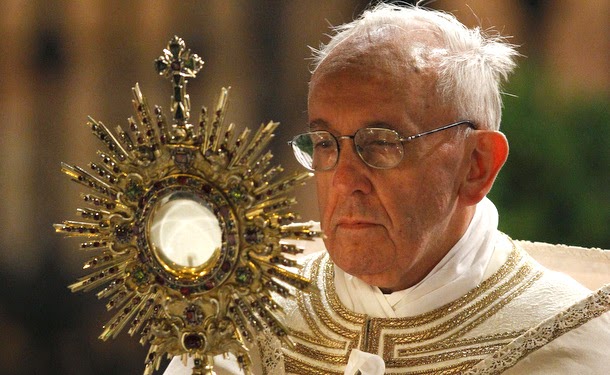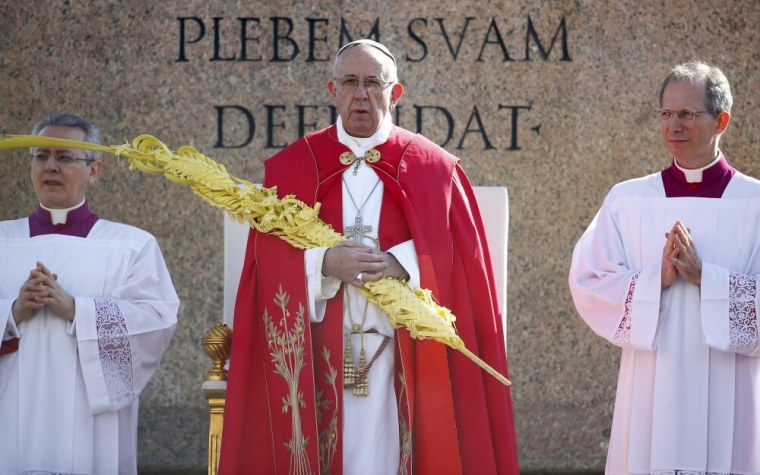Moreover, he said, “some gestures of Pope Francis strike me very much
and are certainly very significant for everyone, even for nonbelievers.
Given my temperament, I would not be able to do them; but then each one
has his own personality.”
In the introduction to his autobiography, the 78-year-old cardinal, who enjoyed a very close relationship with John Paul II and Benedict XVI, wrote, “Pope Francis seeks to shake up consciences by calling into question consolidated habits and customs in the church, each time raising the bar, so to speak.”
“This can cause some bewilderment and upset,” he said, “but the ever harder and more insolent attacks against his person, especially those that come from within the church, are wrong.”
Cardinal Scola added, “Ever since I was a child, I learned that ‘the pope is the pope,’ to whom the Catholic believer owes affection, respect and obedience, since he is the visible sign and secure guarantor of the unity of the church in the following of Christ.” Moreover, he said, “communion with the successor of Peter is not a question of cultural affinity, or human sympathy, or a sentimental feeling; rather it relates to the very nature of the church.”
Concluding his strong critique of attacks against Pope Francis, the cardinal went on to express concern over “the polemics and divisions that are becoming ever more bitter, also at the expense of truth and of charity.” But, he stated, “I do not see the risk of a schism; I fear instead a journey backward” to “the postconciliar debate between conservatives and progressives” over the legacy of Vatican II.
He sees the return of this in “the re-emergence in agitated tones” of “the sterile contraposition” between “the guardians of Tradition rigidly understood” and “the proponents of what is intended to be the adaptation of practice and doctrine to worldly demands.” But like Pope Francis, Cardinal Scola believes the way to overcome these tensions is to entrust oneself to the Holy Spirit, “who does not allow himself to be harnessed by the logic of the opposing camps.”
https://www.americamagazine.org/faith/2020/07/21/cardinal-scola-calls-out-pope-francis-critics-pope-pope
In the introduction to his autobiography, the 78-year-old cardinal, who enjoyed a very close relationship with John Paul II and Benedict XVI, wrote, “Pope Francis seeks to shake up consciences by calling into question consolidated habits and customs in the church, each time raising the bar, so to speak.”
“This can cause some bewilderment and upset,” he said, “but the ever harder and more insolent attacks against his person, especially those that come from within the church, are wrong.”
Cardinal Scola added, “Ever since I was a child, I learned that ‘the pope is the pope,’ to whom the Catholic believer owes affection, respect and obedience, since he is the visible sign and secure guarantor of the unity of the church in the following of Christ.” Moreover, he said, “communion with the successor of Peter is not a question of cultural affinity, or human sympathy, or a sentimental feeling; rather it relates to the very nature of the church.”
Concluding his strong critique of attacks against Pope Francis, the cardinal went on to express concern over “the polemics and divisions that are becoming ever more bitter, also at the expense of truth and of charity.” But, he stated, “I do not see the risk of a schism; I fear instead a journey backward” to “the postconciliar debate between conservatives and progressives” over the legacy of Vatican II.
He sees the return of this in “the re-emergence in agitated tones” of “the sterile contraposition” between “the guardians of Tradition rigidly understood” and “the proponents of what is intended to be the adaptation of practice and doctrine to worldly demands.” But like Pope Francis, Cardinal Scola believes the way to overcome these tensions is to entrust oneself to the Holy Spirit, “who does not allow himself to be harnessed by the logic of the opposing camps.”
https://www.americamagazine.org/faith/2020/07/21/cardinal-scola-calls-out-pope-francis-critics-pope-pope




 The Church in Germany must revise its synodal plans in line with the pope’s leadership and the universal Church, Cardinal Rainer Woelki told the plenary session of the German Episcopal Conference Tuesday morning. Woelki, who is Archbishop of Cologne, told the bishops that Pope Francis had offered
The Church in Germany must revise its synodal plans in line with the pope’s leadership and the universal Church, Cardinal Rainer Woelki told the plenary session of the German Episcopal Conference Tuesday morning. Woelki, who is Archbishop of Cologne, told the bishops that Pope Francis had offered